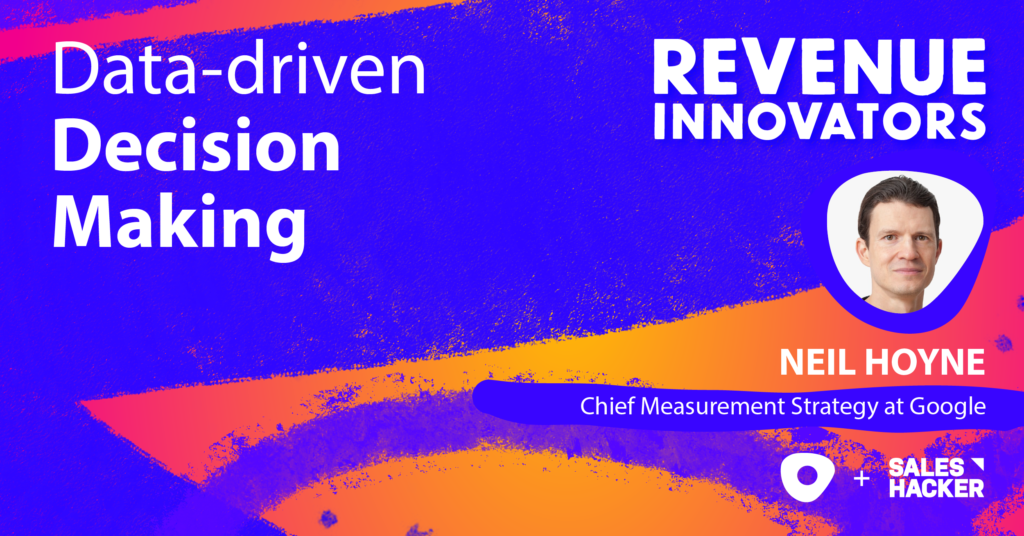You know your business, you know your revenue goals, and you know your strategy for meeting them. But how do you leverage data to help you execute it?
Leveraging data to maximize growth is what we get into in this episode of Revenue Innovators with Neil Hoyne. Neil is Google’s Chief Measurement Strategist, and also the author of Converted: The Data-Driven Way to Win Customers’ Hearts. His passion is to help companies grow by using their data.
During our chat, Neil gives us insights into data best practices — and worst practices— that he’s acquired after working with thousands of different companies from just about every industry across the globe.
The reality is most of us understand how to properly collect data. But we have lots of room for improvement when it comes to leveraging its full power.
In this article, we’ll examine:
- What actually leads to data-driven growth
- The 3 types of data roles every company needs
- Best practices to start implementing today

“We always hear data is the new oil. And that’s a great idea, but so many companies are just sitting on piles of data but doing nothing with it.” – Neil Hoyne, Chief Data Strategist at Google
What actually leads to data-driven growth
Data becomes really valuable when it’s used to make decisions that drive growth. But in Neil’s experience, too many companies simply store and stock data, believing that someday they’ll extract value from it. Unfortunately, they rarely do.
“The worst phrase I hear,” says Neil, “is, Well, we’re just going to give all of our data to data scientists. They’ll figure out what to do with it. Then you ask the data scientists how things are going, and they say “Nobody has any idea what they want.’”
The first step in using data to drive growth is to identify what you need from it in the first place. Data can answer lots of different questions for you. Which ones do you need answers to?
As my co-host, Harish Mohan noted: “You can pump a ton of oil from the ground, but it’s not useful until you refine it and put it in a car.”
RELATED: Use Activity Data to Stop Revenue Leakage in Your Sales Org
The 3 types of data roles you need
The idea that data is worthless on its own, apart from the value we extract from it, is not a new concept.
However, what is new is the idea that there are three distinct roles, each with its own distinct skill set, that every organization needs:
1. People to collect the data
These folks work on cloud systems and APIs. They know how to capture data and sort it internally.
2. People to analyze the data
They distill all of the raw data that’s been collected and turn it into business questions.
In short, these people give the data meaning.
3. People to connect those insights to other parts of the organization
These team members start to answer the questions defined by the analysts, then distribute that information to everyone who needs it.
In short, they guide everyone in what to do with the data.
We’ve long had people to collect and analyze data, but finding and empowering people to spread the stories that come from data to the entire organization is where most companies need to improve.
RELATED: The Benefits of Data-Driven Storytelling with Workday
“Here’s the challenge most companies face,” says Neil. “Simply translating the data analysis sounds like a soft skill. Like the very last bullet point in an analyst job description that’s just nice to have.”
But that mindset won’t help you leverage the real power of data.
Data storytelling is just as important as what comes before it, and it may just be your missing link. That’s why companies successfully driving growth from data are taking this role much, much more seriously.
Data analysts can tell you what has happened. Data storytellers can tell you what can happen.
Data storytellers are the bridge between analysts and everyone else, turning insights into actionable next steps. Data analysts can tell you what has happened. Data storytellers can tell you what can happen.
Best practices that lead to data-driven growth
So you’ve identified what you need from your data, and you’ve created the 3 roles you need to manage it. What’s next? Keep these 6 principles in mind.
Keep data open
Who owns your data? Unless there are legal or privacy reasons that prevent it, keep data open and accessible to everyone rather than locked up with gatekeepers. This will ensure that everyone has the information they need, at the time they need it.
Be data-driven, not data-perfect
Making 100% of your decisions based on perfectly captured, analyzed, and interpreted data just isn’t realistic. Google isn’t even doing this.
The goal is to be one step ahead of your competitors. Sometimes, it’s simply one or two decision changes that can bring significant success. Be satisfied with incremental progress.
Keep data experts in their own lane
Don’t expect analysts to be able to translate their insights into business initiatives. You hired them to work with the numbers, and they should be able to do that to the best of their ability. Instead, find people who are qualified for the role of storyteller.
RELATED: Using Storytelling In Sales to WOW Your Prospects Into a Deal
We share 3 more best practices in our conversation with Neil. Listen to the full episode “Data-driven Decision Making with Google’s Chief Measurement Strategist” and follow us, Mary Shea and Harish Mohan, on LinkedIn for more insights.








